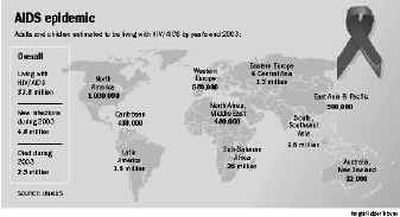AIDS infects record numbers

LONDON – The world is losing the race against the AIDS virus, which last year infected a record 5 million people and killed an unprecedented 3 million, the United Nations reported Tuesday.
The virus has now pushed deep into Eastern Europe and Asia, and tackling it will be more expensive than previously believed, according to the most accurate picture to date of the global status of HIV infections.
The number of people living with HIV has risen in every region. UNAIDS chief Dr. Peter Piot said the deaths and infections were a testament to the world’s failure to get prevention and treatment to those who need it.
Nine out of 10 people who urgently need treatment are not getting it, and prevention is only reaching one in five at risk, the report said.
The AIDS epidemic is now entering its globalization phase, Piot said at the launch of the U.N. AIDS agency’s report, which is compiled every two years and released ahead of the International AIDS Conference, which kicks off this weekend in Bangkok, Thailand.
“AIDS is truly a disease of our globalized world. Whereas until recently AIDS was largely a problem for sub-Saharan Africa, one out of every four new infections is occurring in Asia today, and the fastest growing epidemic is happening in Eastern Europe,” Piot said. “The virus is running faster than all of us.”
In revised estimates based on improved information, the report says about 38 million people are infected. Until now, experts had put the ranks of the HIV afflicted at about 40 million.
Although there have been successes and money is starting to flow, the cost of tackling the pandemic has risen. Two years ago, the United Nations predicted that $10 billion a year would be needed by 2005. Now that figure is $12 billion, because of the cost of delaying action and because the planned campaign is now more comprehensive than it has ever been, said Piot.
Less than half that money has been set aside so far.
The London-based aid agency ActionAid termed the latest figures “depressing and worrying.”
“Business as usual cannot remain the answer. The world needs to spend a lot more money and it must also be more strategic in its approach to the epidemic,” the group said.
Among the reported successes, many countries – including Brazil, Uganda and Thailand – have reduced HIV infections; prices for medicines have dropped dramatically; money is beginning to flow in for the global effort; more politicians are showing commitment to the fight; and medicines are becoming increasingly available in poor countries.
Among the major challenges are improving the plight of women; keeping health workers in the developing world; tackling the stigma surrounding the disease; and looking after children orphaned by it. In some places, the size of the health work force needs to quadruple, the report found.
AIDS remains untamed in Africa and progress there has been mixed. Prevalence is still rising in countries such as Madagascar and Swaziland, even though it is declining in Uganda.
In sub-Saharan Africa, the number of people living with HIV appears to have leveled off at about 25 million. However, that stability is deceptive: Both deaths and new infections are up, and it remains the worst-hit region.
Eastern Europe and Asia, which is home to 60 percent of the world’s population, are emerging as the new front lines in the fight against AIDS.
In Asia, the disease is confined mostly to drug addicts, homosexual or bisexual men, prostitutes and their clients, and the sexual partners of people who frequent prostitutes.
“A country like Thailand shows that AIDS is a problem with a solution. In 1991, 140,000 people became infected in Thailand. Last year it was 21,000,” Piot said. “So there is a major decrease, thanks to a massive promotion of condoms and of encouraging men to change their behavior, to reduce their partners and not engage in commercial sex.”
In one worrying sign, there is a lack of leadership in the fight against AIDS in Asia, outside of Thailand and Cambodia, Piot said.